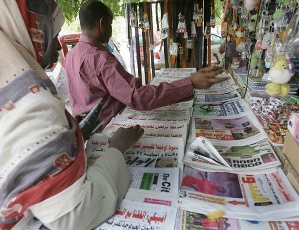Sudan continues to tighten restrictions on newspapers
March 5, 2015 (KHARTOUM) – Sudanese authorities continued to restrict newspapers from publishing stories on social issues as the societal police entered the scene of press restrictions and summoned several journalists to question them on investigations they published related to HIV and statistics of sex workers in Khartoum.
 As of late, the National Intelligence and Security Services (NISS) started scrutinizing newspapers’ coverage of social issues after focusing solely in the past on political, security and military affairs stories.
As of late, the National Intelligence and Security Services (NISS) started scrutinizing newspapers’ coverage of social issues after focusing solely in the past on political, security and military affairs stories.
Sudan Tribune documented NISS summons to reporters since last December over stories on drug-related issues, marriage and prostitution.
Today the societal police interrogated Lubna Abdullah from al-Jareeda newspaper, Roukiya Younis from and al-Tayeb Ali al-Sudani newspaper after ordering them to appear in its headquarters in al-Mugran district.
The agency is tasked with monitoring and detecting crimes related to conduct, alcohol, prostitution and indecent clothing.
It interrogated the three journalists for an hour each and Ali was asked to hand over a recording related to one of his stories.
Last Monday, the NISS summoned journalists Hanan Issa from al-Moustakilla newspaper and Muhammad Saeed from al-Taghyeer newspaper separately because stories they made on marriage and drugs among others.
It also summoned Asmaa Michael Istanbul from al-Tayar newspaper for a story she made on prostitution within the neighborhoods of Khartoum.
Last month, NISS seized entire print runs of 14 newspapers in one day without stating reasons.
Sudanese president Omer Hassan al-Bashir defended the tight control of newspapers saying that when media houses publish false information that creates mistrust between people and government, authorities must invoke the law.
Sudan’s constitution guarantees freedom of expression but laws subordinate to the constitution such as the National Security Forces Act of 2010 contains articles that can be potentially used to curtail press freedom and instigate legal proceedings against newspapers and individual journalists.
Sudanese journalists work under tight daily censorship controls exercised by the NISS.
Journalists say that confiscation and suspension of newspapers is a commonly used practice by the local authorities to overburden the newspapers with financial losses alongside other non-financial pressures.
(ST)
